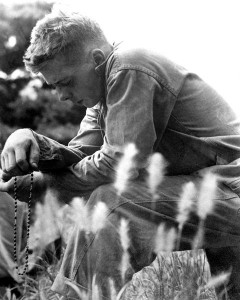
I teased you by saying that I’d be writing today about “How to Build a Better Prayer Life.” That’s a bit too grand a title, but it was indeed a question that I asked several experts while doing research for my article on prayer. I got some intriguing responses.
First, these well-respected researchers made it clear that from a scientific perspective, prayer is prayer is prayer. The physical and psychological benefits of prayer aren’t dependent upon whether you’re Mormon, Buddhist, Hindu, Presbyterian, or a nature worshipper. You can pray the rosary or chant a mantra, use the Book of Common Prayer (that’s a shout-out to all you Episcopalians out there) or speak in tongues. Prayer is good for you, no matter how you do it.
Except when you do it in an unhealthy way.
OK, so that sounds contradictory. But a number of these experts talked about how there is a type of prayer that is problematic. Harold Koenig of Duke University put it this way: “The physical and psychological benefits of prayer might be said to be an unintended side effect of prayer. If the only reason you’re praying is that you want something and if something else happens you’ll be upset, that’s an unhealthy way of praying.”
Rigidity in prayer almost always leads to disappointment, after all. If we’re so focused on a single result, we’re not praying, but rather attempting to turn prayer into a type of magic. The purpose of prayer is rather to align ourselves with the divine. The old saying is right: prayer doesn’t change God, but instead changes us.
Another scientist talked about leaving “wiggle room” in his prayers. This is what I want, but I know God is a better judge of what’s good for me or the person I’m praying for. In other words, prayer shouldn’t be so focused on the outcome that one cannot be at peace with any other result.
I found it interesting when author Larry Dossey brought up a related issue, that of whether prayers can cause harm to others. “I think they can—in fact, I think we’re often reckless with our prayers,” he said. “We need to be careful about what we pray for. I’m very uncomfortable with the idea of praying for victory in war, for example, or even in a sports contest. There are studies that have been done on laboratory animals and bacteria that show that people can have a negative impact on other living things with their intentions. Prayer is powerful, for good or ill.”
Intriguing, isn’t it?
Let me end with two last tidbits from my series of conversations with experts. The first is from Jeff Levin of Baylor University, someone who has spent his life studying the science behind prayer but who has a clear-eyed view of the limits of his work. “I believe in prayer,” he said. “I’m Jewish, I go to synagogue, I pray. It’s meaningful to me. I’m not going to base my religious practice on whether the latest double-blind trial finds something or doesn’t find something. The ability to connect with God, to connect with the eternal and holy, is a precious resource that we all have. That’s why I pray, not because science proves that it’s good for me.”
The other comment comes from Philip Yancey, an author whose work I have long admired (I recommend What’s So Amazing About Grace? in particular). “It’s easy to make prayer into an imposing task, some secret formula that allows us access to an otherwise inaccessible deity,” he told me. “Actually, I’ve learned that prayer is very simple: a way of conversing with a God who seems eager for relationship with human beings. In the past I would try to figure out what might sound impressive, or which requests seemed most likely to elicit a positive response. I don’t do that anymore. Instead I tell God exactly what I’m feeling and exactly what I want. Such an approach has very good precedent in the Book of Psalms, which comprises 150 of the most heartfelt, varied, unscripted prayers you can imagine. If God already knows the secrets of our heart, why put up a front? We are the ones who benefit most from complete honesty and transparency in our prayers.”











